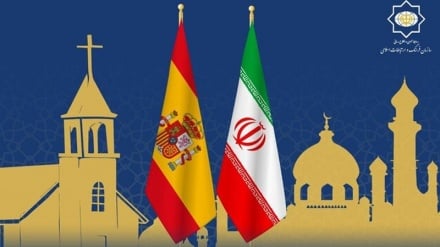The visage of Prophet Jesus (AS) in Islam
Today Christians, especially in the West, are celebrating Christmas. Although we Muslims, as well as many learned Christians well-versed with the history and development of their faith, do not believe that Prophet Jesus (peace upon him) was born on December 25, the advent of this day affords us the chance to focus on the dynamic personality of this Prophet of Peace, whose teachings have sadly been distorted beyond recognition by those who have turned him into a godhead.
In the holy Qur'an, in a passage describing the annunciation to the Blessed Virgin Mary (peace upon her), Prophet Jesus (PuH) is described as a Word from God. In ayah 44 of Surah Aal-e Imran, we read: "O Mary! Verily Allah gives you the glad tidings of a Word from Him; his name is the Messiah, Jesus son of Mary, eminent in this world, and in the Hereafter of those near [to God]"
The context in which this ayah was revealed was one of inter-religious encounters. The Christians of Najran in Yemen had sent a delegation to the Messenger of Islam, Prophet Mohammad (SAWA), to question him about the teachings of Islam concerning Jesus. It was then that God Almighty revealed this and other ayahs of Sura Aal-e Imran in response. These ayahs are not a denial of Christian teachings, although the divinity of Christ is clearly rejected, but are an affirmation of much of the beliefs of the Christians, as is evident in ayah 171 of Surah Nisa: 'O People of the Book! Do not go to extremes in your creed, and do not say of Allah but the Truth. Verily, the Messiah, Jesus the son of Mary, is only a Prophet of Allah and His Word which He conveyed unto Mary, and a Spirit from Him.
Thus, as is clear, in addition to being called the “Word of God”, Jesus is also called a “Spirit of God”. However, the interpretation of the Word of God differs. For the Christians, according to the Gospel of John, the Word was God and the Word became flesh.
For the Muslims, the Word is a creature of God and definitely not God, for it is God's utterance of the word 'Be' that creation takes place.
In other words, to call Jesus the Word of Allah is not to deify him, but to verify his status as a prophet. Because of his high status, Jesus conveys the message of God, or the one who can speak on behalf of God. He is thus a Messenger of God, since God is far too glorious to have the human characteristics of the need of son or children.
To be more precise, Jesus becomes the Word of God not because of an incarnation whereby his flesh becomes divine, but because his spirit is refined to such an extent that it becomes a mirror of divine attributes, in the same way as a temple, a church or a mosque are considered holy not because of any inherent sanctity in the structure, but because it is the place of the worship of God.
The differences between Islamic and Christian thinking about Jesus are as important as they are subtle. Both accept the virgin birth, although it is ironic that a growing number of liberal Christians have come to have doubts about this miracle while Muslims remain steadfast! Among the other miracles attributed to Jesus in the Glorious Qur'an are the revival of the dead and the creation of a bird from clay, but all of the miracles performed by Jesus are expressly by the permission of Allah. Just as in the miracle of his birth, Jesus came into the world by a human mother and divine spirit, so too, his miracles are performed as human actions with divine permission. In this regard the error of the Christians is evident. They have clearly failed to discern the underlying truth that whatever Jesus did was as a creature with the permission of God.
The point is that deifying Jesus is an obstacle to discovering the real Jesus. It could be said that the Christian doctrine of the incarnation prevents one from finding the real Jesus, because his imagined divinity gets in the way. It is here that Islam comes to the rescue. The holy Qur'an reminds both Christians and Muslims of the real nature of God by urging them to use their intellect. The important difference between Islam and Christianity is not over the issue of whether Jesus saves mankind, but how he saves. Islam refutes that salvation is through redemption resulting from the crucifixion, and instead turns its attention to the instruction provided in the life of the prophets.
These days there is much discussion of dialogue between different faith communities. Conferences have been held for this purpose in the Islamic Republic of Iran as well as in Africa, Europe and the United States. Perhaps one of the best ways Christians can find common ground for discussion with Muslims is to become familiar with the portrait of Jesus presented in Islamic texts, the most important of which is the holy Qur'an, the Almighty Creator’s Last and Final Heavenly Scripture for all mankind and for all times.
Of course, hadith or the statements of the Prophet and the Imams of his Infallible Household, regarding Jesus, also deserve careful attention. For those of us who have the honor of being counted among the Shi'ah Muslims, the importance of what has been related by the Ahl al-Bayt weighs especially heavily, as it should, in accordance with the famous Hadith Thaqalayn, in which the Prophet before passing away had emphasized several times, saying:
"Indeed, I am leaving with you two weighty things (Thaqalayn): the Book of Allah and my progeny the Ahl al-Bayt; hold fast to them, for the two never separate until they return to me by the Fountain [of Kowthar on the Last Day]."
The humanity of Jesus, along with his divine mission, is evident in the narrations from the Imams of the Ahl al-Bayt. It is a perfect humanity, and as such there is no denying its supernatural dimension.
By trying to see Jesus as the Muslim sees him, the Christian may find his saviour come to life, lifted up to God in his own inner life rather than crucified. To begin with, Jesus, along with the prophets Noah, Abraham, Moses, Peace be with them, and Prophet Mohammad (SAWA) has a special status in Islam as one of the five greatest prophets, the ulu al-azm, who brought the divine law. What was revealed to the last of them, that is the Prophet of Islam, is a confirmation of what was revealed to the others. The simple morality taught by Jesus and which continues to be emphasized in Islam resonates in the narrations of the Imams of the Ahl al-Bayt. From these narrations we not only become reacquainted with the moral teachings of Jesus and with his character, but we also discover what the Household of the Prophet found it important to transmit about him, and thereby we get a glimpse into their moral teachings and characters, too.
God Almighty in ayahs 16 to 21 of Surah Mariam refers to the Virgin Mary as follows:
“And mention in the Book Mary, when she withdrew from her family to an easterly place.”
“Thus did she seclude herself from them, whereupon We sent to her Our Spirit and he became incarnate for her as a well-proportioned human.”
“She said, ‘I seek the protection of the All-Beneficent from you, should you be Godwary!”
“He said, ‘I am only a messenger of your Lord that I may give you a pure son,”
“She said, ‘How shall I have a child seeing that no human being has ever touched me, nor have I been unchaste?”
“He said, ‘So shall it be. Your Lord says, “It is simple for Me.” And so that We may make him a sign for mankind and a mercy from Us, and it is a matter [already] decided.”
God gave Jesus astounding miracles, as he had granted to the other prophets. God granted him permission to heal the blind and those who suffered from other diseases. One of the most amazing miracles of Jesus was the revival of the dead. He raised to life many people on divine command. He even informed them of the foods people ate or stored at home.
Despite all these miracles, there were few who believed in Jesus. The leaders of the Israelites, who saw their position at risk, feared his mission and plotted against him. They viewed the Messiah as an obstacle to their desires, so they sought to kill him. But God lifted Jesus to the heavens and saved him from the Israelites and the pagan Romans, who crucified one of the seditious persons they mistook for the Messiah. Christians and some other people believe that the enemies of Jesus crucified him and killed him on Friday. But after three days since the death of Jesus, on Sunday, he revived and went to heaven. But the holy Qur'an rejects the death and crucifixion of the Messiah, and says in ayah 157 of Surah Nisa:
“And for their saying, ‘We killed the Messiah, Jesus son of Mary, the apostle of Allah’ —though they did not kill him nor did they crucify him, but so it was made to appear to them. Indeed those who differ concerning him are surely in doubt about him: they do not have any knowledge of that beyond following conjectures, and certainly they did not kill him.”
Yes, God saved Jesus from his enemies and lifted him to the heaven. Jesus will return to the Earth in the end times to serve as lieutenant to Imam Mahdi (may God hasten his reappearance), the 12th and Last Infallible Heir of Prophet Mohammad (SAWA) for establishment of the global government of peace, prosperity and justice.
AS/MG


